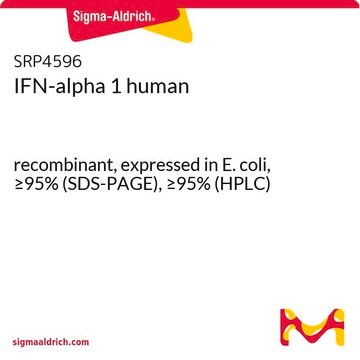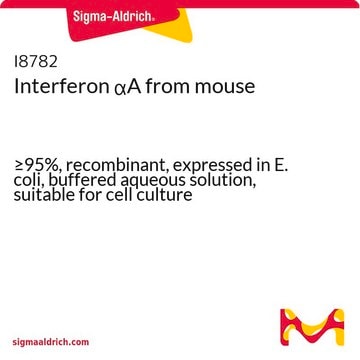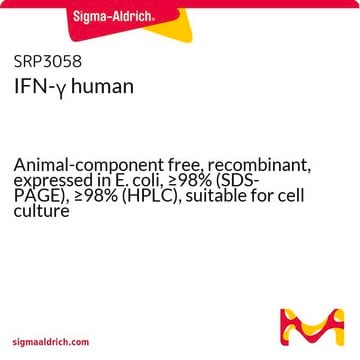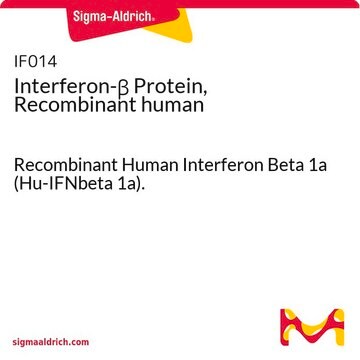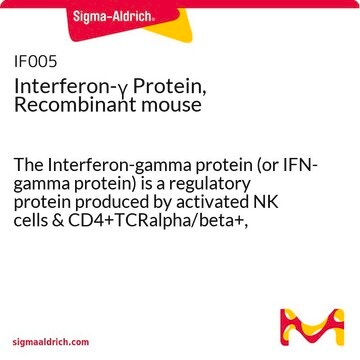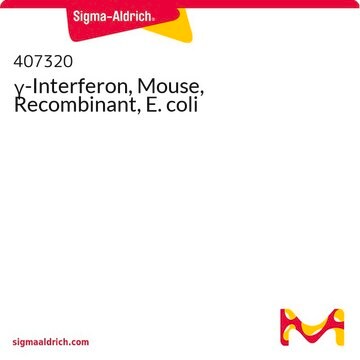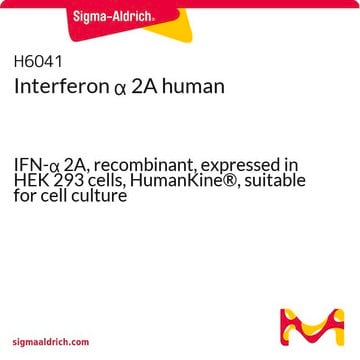Fontos dokumentumok
I9032
Interferon β from mouse
≥95%, recombinant, expressed in E. coli, buffered aqueous solution, suitable for cell culture
Szinonimák:
IFN β
About This Item
Javasolt termékek
biológiai forrás
mouse
Minőségi szint
rekombináns
expressed in E. coli
Teszt
≥95%
Forma
buffered aqueous solution
molekulatömeg
~20 kDa
kiszerelés
pkg of 1 vial
koncentráció
2560000 units/mL
technika/technikák
cell culture | mammalian: suitable
UniProt elérési szám
kiszállítva
dry ice
tárolási hőmérséklet
−70°C
Géninformáció
mouse ... Ifnb1(15977)
Általános leírás
Alkalmazás
- in the stimulation of bone marrow-derived dendritic cells (BMDCs)
- as a cytokine to stimulate differentiation of podocytes
- to stimulate splenocytes
- to induce the activation of cholesterol 25-hydroxylase, by in vitro stimulation of bone marrow-derived macrophages, dendritic cells and CD11c+ lung macrophages
- to stimulate splenocytes, in order to study the secretion and regulation of IFN-γ
- to intranasally pre-treat neonatal mice, to study its effects on the protective actions of Lactobacillus rhamnosus GG (LGG)
- as a standard to treat MEF-Mx2-luc-BKO reporter cell line for IFN-β measurement, in response to human adenovirus-5 (HAdV-C5)
Biokémiai/fiziológiai hatások
Fizikai forma
Analízis megjegyzés
Tárolási osztály kódja
10 - Combustible liquids
WGK
WGK 1
Lobbanási pont (F)
Not applicable
Lobbanási pont (C)
Not applicable
Egyéni védőeszköz
Eyeshields, Gloves, multi-purpose combination respirator cartridge (US)
Válasszon a legfrissebb verziók közül:
Analitikai tanúsítványok (COA)
Nem találja a megfelelő verziót?
Ha egy adott verzióra van szüksége, a tétel- vagy cikkszám alapján rákereshet egy adott tanúsítványra.
Már rendelkezik ezzel a termékkel?
Az Ön által nemrégiben megvásárolt termékekre vonatkozó dokumentumokat a Dokumentumtárban találja.
Az ügyfelek ezeket is megtekintették
Tudóscsoportunk valamennyi kutatási területen rendelkezik tapasztalattal, beleértve az élettudományt, az anyagtudományt, a kémiai szintézist, a kromatográfiát, az analitikát és még sok más területet.
Lépjen kapcsolatba a szaktanácsadással
